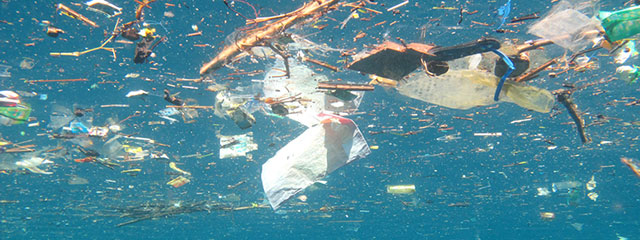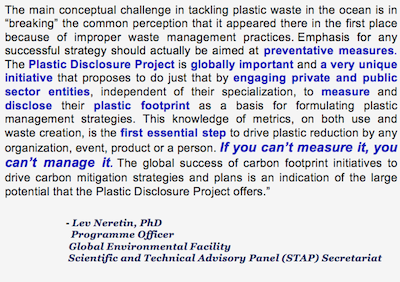
Date: 2025-11-18 Page is: DBtxt003.php txt00009387
Initiatives
Plastic Disclosure Project
Why the Plastic Disclosure Project? About the PDP ... How PDP works
Burgess COMMENTARY
Peter Burgess
Why the Plastic Disclosure Project?
PDP asks the business world to measure, manage, reduce and benefit from plastic waste in order to create a world in which plastic adds value for consumers and businesses without negatively impacting the environment.
Did you know that although plastic is beneficial to our daily lives in so many ways, that there are some issues that result when we don't treat it as a resource:
Roughly 33% of plastic is for single use, and then thrown away.
Approximately 85% of total global plastic used is not recycled.
Plastic has the potential to stay in the environment for hundreds of years.
Plastic negatively impacts over 700 species of animals and birds.
Why PDP?

Plastic pollution is a global problem with long-lasting environmental impact if not dealt with properly at the end-of-life (as a resource, instead of a waste product). Plastic uniquely ties many of our companies and communities together, as almost all of us use it in some way. A focus on plastic as a waste issue can link to topics that relate to clean cities, energy and climate issues, water quality, product design, new material use, and innovation that lead to new business solutions and investment opportunities.
Why the Plastic Disclosure Project?
What is the Plastic Disclosure Project (PDP)?
PDP asks the business world to measure, manage, reduce and benefit from plastic waste in order to create a world in which plastic adds value for consumers and businesses without negatively impacting the environment.
Our Objectives
Reduce plastic waste in the environment
Encourage sustainable business practices vis-a-vis plastic
Inspire improved design & innovative solutions
Our Mission
Support annual disclosure of plastic footprints/ management strategies
Encourage efficiencies in plastic use, reuse and recycling
Broaden awareness of plastic investment risks and opportunities
About Us
The Plastic Disclosure Project is a project of the Hong Kong and California-based Ocean Recovery Alliance. The group is focused on bringing innovation, technologies, creativity and collaborations together to address some of the challenges that face the ocean and our broader environment. Two preventative solutions to the plastic waste issues are the PDP and Global Alert, both of which were announced at the 2010 Clinton Global Initiative in New York. Ocean Recovery Alliance is now working with both the United Nations Environment Programme (UNEP) and the World Bank's Global Partnership for Oceans on PDP research and programs for cities and their waste analysis. The first project was in Colombia with the Ministry of Environment, and a three-city study along the Magdalena River Basin, which leads into the Caribbean. This report, and the report on the Natural Capital Cost of Plastic in the Consumer Goods industry (joint program with UNEP and Trucost), will be released in the summer of 2014. Please join us at the 3rd annual Plasticity Forum in NYC on June 24th to discuss ways in which businesses and governments can collectively scale solutions, so that there is no waste footprint at the end of the day.
Background
The Plastic Disclosure Project is an initiative that requests annual reporting and transparency regarding the production, use and handling of plastic and plastic waste by organisations. By measuring the amount of plastic that flows through an organisation, efficiencies can be gained in cost reduction, wastage reduction, new design, new materials, and better recycling. While designed for large corporates, institutions such as hospitals, universities, government offices and sports associations or teams can also participate to calculate and report their own 'plastic footprint' on an annual basis.
The investment community is interested in this topic too, as new value can be realized by companies who take time to review and report their improvements in plastic management, and not just value from the potential improvements in their own bottom lines. New innovations and improved changes in material use and design should also have benefits for companies’ consumer bases, employees and the environment in which they reside, positioning them to better avoid reputational, regulatory, liability and economic risks, and sieze opportunities. Investment institutions interested to know more about the project, or who wish to join as signatories to the project, are encouraged to contact at info@plasticdisclosure.org.
Survey responses will be made publically available, where agreed by the responding corporates. All responses will be fully available to the investor signatories. A public report, summarizing the survey findings, will be published on an annual basis. Questionnaires will be circulated on behalf of the investors to a global list of companies, in particular from sectors which are recognized to be larger users of plastic in their business operations.

Why the Plastic Disclosure Project?»
How It Works
If you don't measure it, you can't manage it........
How It Works
On behalf of a wide range of stakeholders, including the world's sustainable investment community, the PDP asks companies and institutions to measure and report on their plastic use or waste creation/aggregation within their scope of operations. This is not to say that plastic should not be used, but that if it's use is measured, that management of the material will become more efficient, innovative, cost-saving, and sustainable. An annual report will be prepared that analyzes and reports on the information received from companies and institutions within different use groups for comparison. In addition to companies, universities, hospitals and local governments will be encouraged to participate. The annual report will be made available to investors and other stakeholders, the reporting organizations, and the general public. Examples of solution providers and industry leaders will be highlighted on the PDP website.
All types of companies can participate in PDP, whether publically or privately held, since almost all of us use plastic in one way or another for different parts of our businesses or organizations. The main focus of the PDP is on companies in the consumer goods and technology sectors, as well as other service industries such as airlines and hotels that may use or sell plastic-intensive products on a relatively large scale. The PDP also encourages smaller companies to become involved, some of whom have new solutions or best practices that can be applied on a larger scale.
In addition to companies, other organizations can also join PDP -- commiting to measure and report their plastic footprint. and develop plastic management strategies that are environmentally friendly.
For more information on PDP, please contact: info@plasticdisclosure.org
For organizations that would like to participate in PDP including companies, universities, hospitals, local governments or other institutions, please contact adopter@plasticdisclosure.org
For asset owners, fund managers, non-profits and other stakeholders that would like to support the PDP by signing an endorsement letter or providing financial support, please contact: supporter@plasticdisclosure.org
Contact Us
For more information on PDP, please contact us at info@plasticdisclosure.org For organizations that would like to participate in PDP as disclosers including companies, universities, hospitals, local governments and other institutions, please contact us at adopter@plasticdisclosure.org For asset owners, fund managers, non-profits and other stakeholders that would like to support PDP by signing an endorsement letter or providing financial support, please contact us at supporter@plasticdisclosure.org
Contact PDP c/o Ocean Recovery Alliance, 20th Floor, Central Tower, 28 Queen's Road Central, Hong Kong
info@plasticdisclosure.org TEL: +852 8197 7378 Please also visit: www.oceanrecov.org